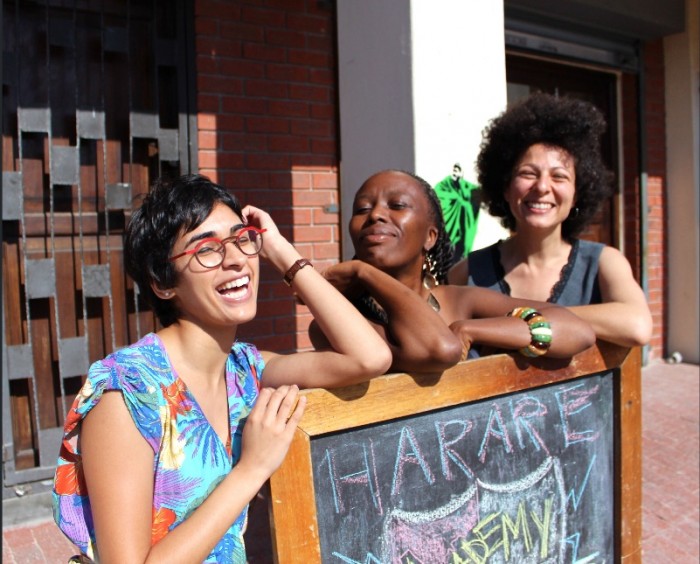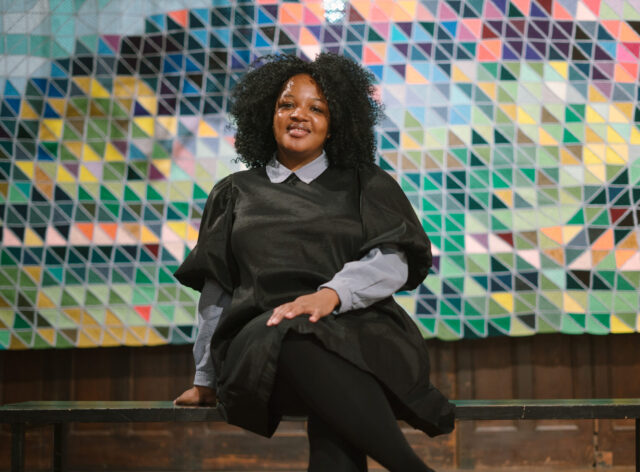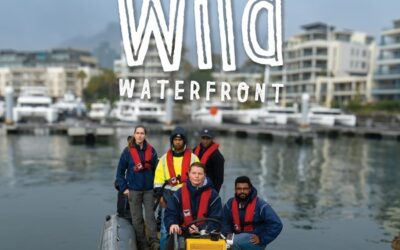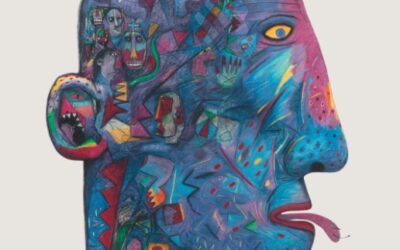A young teacher from Khayelitsha, Brenda Skelenge, is curating the biggest public arts festival that her neighbourhood has ever seen at Moholo Live House, writes Valeria Geselev.
Backed with a vision, patience, dozens of artists and support from UCT, she turns a small restaurant into The Harare Academy of Inspiration. On the menu: free daily workshops, exhibitions, live music, dance performances, history lectures and sex education.
Imagine that around the corner from your home opens up an “Academy of Inspiration”, hosting everyday free and open cultural activities for the community. One day you find there a lecture about history, another day – a photo exhibition, and so on with yoga classes, workshops in poetry, land art, theatre plays and live jazz.
From the 1st of November the residents of Harare, Khayelitsha will wake up to that kind of reality. All thanks to one woman with a vision.
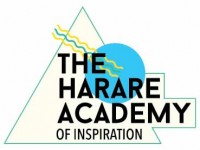
Just in time for the educational revolution
The name academy references a suggestion for looking at art as a channel for alternative education system. The teachers are creatives who share their experiences and skills; the classes are structured in interactive and participation-based workshops and students of all ages and backgrounds are welcome for free to attend. The list of facilitators, or inspiration officers as they are called in the project, includes “the all-stars” of local upcoming artists: curator Khanyisile Mbongwa will host 2 days workshop in critical photography with mobile phone cameras; activist Siddiq Khan will screen a film about the Mexican revolution to spark a discussion about South African politics; trumpeter Mandla Mlangeni will arrive from Johannesburg to launch his album in a live jazz concert; artist Janet Ranson will create portraits as collective collages; theatre-makers Zimasa May, Themba Baleni and Richard September will workshop pop-up plays; choreographer Jackie Manyaapelo will come straight from her shows in Artscape to perform her new dance piece, and workshop movement.
The long list of classes will end with a grand-finale open air performance of big band, orchestrated by local jazz legend Louis Moholo. Brenda herself will facilitate a records listening session for the elders of the community, whom she will invite from old-age homes.
The timing couldn’t be more relevant to the public discourse about ‘de-colonization’ of local academic institutions. Symbolically, last Monday as The Inspiration Academy programme was launched, started the demonstrations of UCT students protesting the high tuition fees in South African. While the students in other universities around the country joined in a movement to change the old-fashioned mind set, Brenda and her team of creatives are establishing a new kind of university, re-inventing academia as a free space of knowledge traffic tailored for its environment.
In the proposal, designed with partnering art curators, she states “The project re-imagines schools and community centres, providing all classes and ages the opportunity to sit in a dream classroom. We use multi disciplinary art to express contemporary notions and narratives of knowledge traffic in society”.
One woman show, with plenty of patience
Brenda is a working class super hero. She manages to raise four boys, to work as a teacher, operate a restaurant, curate cultural events and find the time for community activism. Her dream for many years was “to bring Obs to Khayelitsha”. She used to live and still goes out often in Observatory (Obs), the cultural and artistic hub of the Southern Suburbs. “Why should people drive so far from the townships to listen to good live music or have an interesting conversation with like-minded artists?” she thought. Even though both spaces are considered to be in Cape Town, they are far – 25 km – and it is expensive and inconvenient to commute between the two, especially in evening hours.
To address this vision Brenda started with a tent in the back yard of her house in Khayelitsha, hosting DJs, poetry, live music, home-made food and second-hand cloths on sale. The mini-festivals, called ‘Trending Khalture’, became popular and drew local crowd and guests from CBD started coming to Khayelitsha. Then she saw an advert for a ‘tavern’ to let in the new business square in Harare section of Khayelitsha. At first she did not get the contract, they chose someone else.
A year later she got a call – inviting her to submit again. With no budget or plan, yet with huge ambition and supportive crowd of friends she now looks back and smiles with what the place turned out to be.
She opened the restaurant ‘Moholo LiveHouse’ in June 2014, naming it in honour of local jazz legend, drummer Louis Moholo. Since, countless cultural events took place at Moholo LiveHouse. Without even a signage on the building, Brenda’s vision came to life. To make it sustainable and pay the rent, she knocked on too many doors to count – potential sponsors, asking for kitchen equipment donations, offering cultural institutions to partner and looking for governmental collaboration. Dozens of unanswered emails piled in her sent-items folder. Luckily she is not into counting or accounting, and that is probably what saved her from giving-up and keep on knocking when she saw the open-call from UCT. That buys her one month grace and hope for more support to follow.
Moving art out of the city centre
In the reality of Khayelitsha her vision plays an important role. Harare business square, where the Academy of Inspiration will be based, was built to provide community services such as commerce and culture. The busiest space today is the ATM, Spar and the pop-up church on Sundays. There are also a post office, a crash, and small businesses such as laundry, internet cafe and vegetable/food stalls. In the cultural category there is a public library which is under-used by the community. Recently, the popular Khayelitsha Hubspace (resource centre for entrepreneurs) closed its doors and moved to Philippi due to rent challenges, which left the youth of the community without a space for creative growth. This is the gap that Brenda wishes to fill in.
Cape Town becomes a world-known Public Art capital in the recent five years, with Infecting the City Festival taking place in the streets of CBD every March and First Thursdays monthly movement opens galleries in late hours. Art is coming out of museums and addresses wider audiences.
As in fine art, so in public art, original artistic projects usually happen in CBD/town and its next door suburbs (like Woodstock and Obs). “We are Re-thinking the relationship between public art and place in Cape Town” says Brenda, “our project will pioneer another direction, where an exciting new and innovative happening is taking place in a township. The same goes for our audience – we address the locals, not the tourists, who are welcome, but not targeted. Khayelitsha becomes a centre of creation, not duplication. The power balance with the historic/economic centre of Cape Town CBD shifts”.
WHERE: The Harare Academy of Inspiration will be based in Moholo LiveHouse, 42 Ncumo Road, Harare Square, Harare, Khayelitsha, Cape Town7784 (in front of Harare Library). WHEN: 1-30 November (Every day, during the day). INFO: Details are updated on Moholo LiveHouse facebook page. To register as facilitators, sponsors or students email or call trendingkhalture@gmail.com C 073-9401556
Valeria Geselev is an independent public art curator and a founding member of The Harare Academy of Inspiration project. This article first appeared in The Cape Times.

